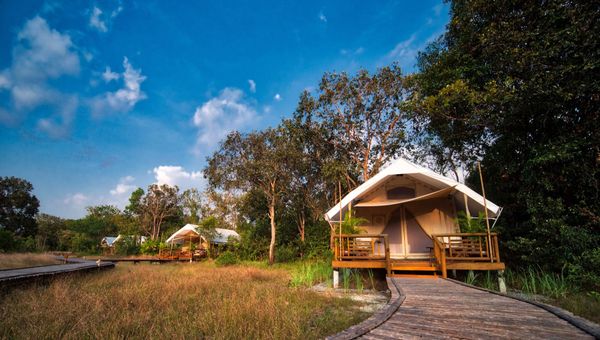How can travel agents increase climate awareness?
Masaru Takayama, chairman of the Japan Alliance of Responsible Travel Companies, offers advice for promoting sustainability.
Educate yourself: Understand sustainable tourism standards like those of the World Sustainable Tourism Council. At trade shows, look out for and learn from responsible businesses. The SDGs make your future customers sustainability-conscious. How can you sell to them if you don't speak the language?
Respect local guidelines. Follow the do's and don'ts of each country. But travel agents need to educate themselves first and change their behavior to convince their customers. A good destination to visit is also a good place to live. Treat it like you are visiting someone's backyard.
Promote secondary destinations: Add at least one lesser known or less visited destination, especially for Asian travelers who frequent the major tourist spots. For example, there's a lot more to Japan than sushi and anime.
Low Carbon Transport: Redesign tours to promote trains, public transport and energy-efficient accommodation to reduce environmental impact.
Travel has literally never been hotter.
With each passing year, extreme weather events increasingly disrupt travel around the world. 2023 was supposed to be the year of revenge travel, but a series of disasters, including scorching heatwaves in Europe, wildfires in Canada, and floods in Australia and New Zealand, devastated travel destinations around the world. Most recently, a blistering heatwave hit Southeast Asia, sending temperatures into the high 30s and triggering health warnings across the region.
“Climate change is impacting our destinations in ways that affect both local life and tourism,” said Hamish Keith, CEO of Exo Travel. “We are seeing more frequent and intense weather events, such as floods and heatwaves, sometimes leading to temporary closures and changes to tour schedules.”
In Japan, unexpected snowfall at ski resorts, coral bleaching and early cherry blossom blooming have disrupted travel patterns, complicating when tourists can travel, said Masaru Takayama, president of Spirit of Japan Travel.

Sustainable travel advocates (from left): Willem Niemeijer of Yaana Ventures, Hamish Keith of Exo Travel, Yock Song Law of Tribe Tours and Mike Steward of Intrepid Travel.
As the heatwave continues, tour operators and DMCs in Asia are adjusting their programs and itineraries to cope with rising daytime temperatures. Common strategies include starting outdoor active tours, such as cycling or trekking, earlier to avoid peak daytime hours, and planning city walks with more shade and plenty of time for breaks.
Willem Niemeyer, CEO of Yaana Ventures and founder of Kiri Travel, said: “In really hot weather, we encourage guests to slow down their itinerary, leave a little earlier and, if possible, stay indoors during the day to enjoy the hotel pool a little more. Certain activities, such as diving, are less affected by the temperature.”
So far, the biggest impacts of climate change have been on infrastructure, notes Exo Travel CEO Hamish Keith: “For example, Topas Riverside Lodge in Sapa, Vietnam, sustained significant damage from flash flooding in late 2023, leading to its permanent closure. This unexpected event has meant we have had to re-route tours to alternative properties.”
“Similarly, Muang La Lodge in northern Laos was irreparably damaged by a dam collapse. As a result, we had to reroute one of our most popular northern Laos itineraries to Nam Kat Yo Lapa, about an hour away. We have experienced similar situations in Indonesia, which is highly vulnerable to the effects of climate change, and more recently in Japan,” said Keith, who operates in 11 countries in the region.
Overall, industry players feel that Southeast Asia is in a relatively favorable position as weather impacts have not been as extreme so far, and tourists generally do not express concern about climate change, although this varies by market.
Mike Steward, Intrepid Travel's general manager for Thailand and Laos, noted that thanks to its long-standing reputation as a responsible adventure travel company, Intrepid's clients – the majority of whom are from Europe, North America and Australia – are already 'climate conscious' and actively seeking sustainable travel experiences.
“Guests now ask our guides more detailed questions about sustainability,” he said. Intrepid, which became a carbon-neutral company in 2010 and the tourism sector's largest B Corp since 2018, is currently working toward science-based emissions reduction targets.
In Singapore, Tribe Tours has seen an increase in interest in sustainability experiences. Travelers are no longer content to simply visit and explore the city's major attractions, but are looking to incorporate educational learning into their tours, according to Yock Song Loh, head of partnerships and business development at Tribe Tours. Some are seeking out sustainability experiences unique to Singapore, such as vertical farms, to understand the country's strategies on food resilience and sustainable building.

Tribe Tours is rolling out more sustainability experiences like “Zero to Hero,” also known as the “dirtiest tour,” where guests search for vegetable waste and unpalatable food at a local wet market for a unique cultural experience. Photo courtesy of Tribe Tours
So Tribe Tours is rolling out more experiences of this nature. “Zero to Hero,” which Lo calls “the dirtiest tour,” takes guests to the heart of the city to visit a local wet market, digging through vegetable scraps and unpalatable food while offering a unique perspective on local culture. During the tour, guests will see the basics of Singapore's public housing, from composting food waste at the wet market to solar panels on the rooftops.
But currently, sustainability seems to be a lower priority for leisure travelers than factors like price, says Yok Son, who also organises events for corporate and educational organisations: “Business events promote sustainability, but in the leisure sector decisions tend to be driven more by price rather than sustainability.”
To reduce their environmental impact, DMCs and tour operators encourage their customers to travel slower, spend more time in a destination, and do more. This encourages travelers to spend more time in a destination and incorporate more activities, which creates a smaller carbon footprint than cramming multiple cities into an itinerary.
Using trains, bikes and public transport not only reduces your impact on the environment but also gives you a truly local experience, and DMC also incorporates low-carbon transport options into its tours, including electric bikes, electric tuk-tuks and solar-powered boats.
“Fly less domestically and regionally and stay longer. Enjoy getting to know the area better rather than just seeing the sights. Take the train more often, plant a tree or support an environmental conservation project while you travel,” suggested Niemager of Kiri Travel.

A portion of every visitor's spend at Cardamom Tented Camp helps protect 18,000 hectares of lowland rainforest. Photo credit: Yaana Ventures
Yaana Ventures is also actively involved in reforestation projects on the ground. Its lodges in Chiang Rai and Khao Sok have reforestation projects on their premises, and Cardamom Tented Camp is working to conserve 18,000 hectares of lowland rainforest. “This is a hands-on environmental and anti-pollution program and we and other tourism companies feel we can play a practical, hands-on role,” Nijemaa said.
Exo Travel is currently working with Path Net Zero to measure its carbon footprint and with Ecollective to calculate the environmental impact of each experience. This approach allows them to pinpoint emissions based on the characteristics and scale of specific activities. “This data-driven approach not only helps us quantify emissions, but also informs strategic decisions aimed at maximizing the sustainability of our services while minimizing our carbon footprint,” says Keith.
“We've also partnered with Hotel Resilient to create an online platform that ranks and evaluates hotels based on various sustainability metrics. The organization compiles key indicators of a hotel's sustainability efforts and ranks them based on a set of criteria. In this way, we aim to promote responsible hotels that are taking action to reduce their carbon footprint and ultimately become more resilient to climate change.”
“Sustainability is becoming an expectation of travelers today, not just a specific segment,” Stewart said. But he's also noticed growing enthusiasm for sustainability among his B2B partners, who are asking questions about purpose and supply chains. This can only be a good thing. Heightened climate awareness is also encouraging industry players to continue to act green. “I think this is going to force change on travel chains.”
Ultimately, collective action as an industry was needed.
“Tourism is on the front lines. If we don't look at this, tourism will be greatly affected,” Steward said. “We need to work hard and work together to make a difference. We need to act faster.”
This article is part of the Travel Weekly Asia April-June 2024 issue. To read the rest of the issue, click here.



